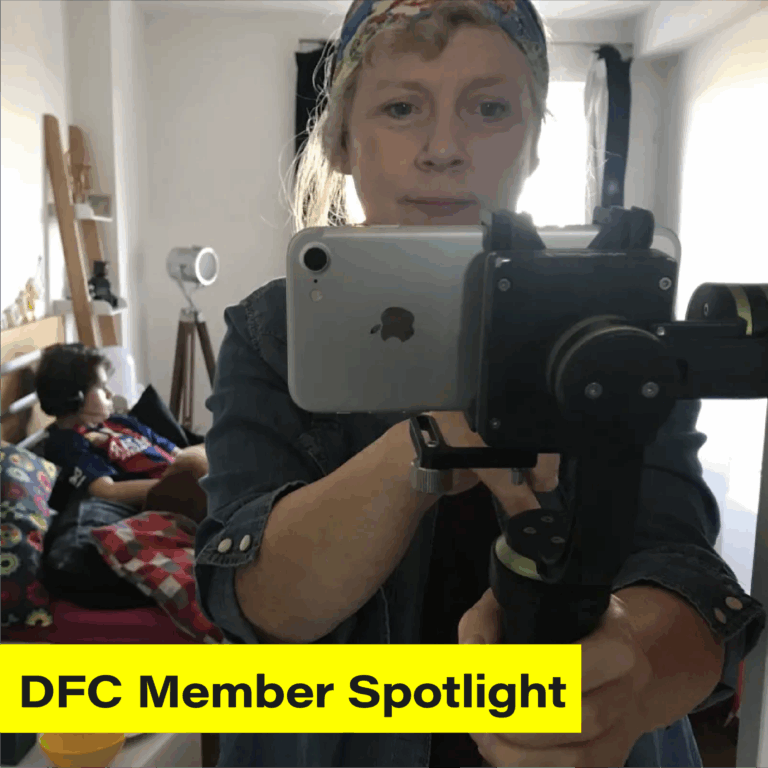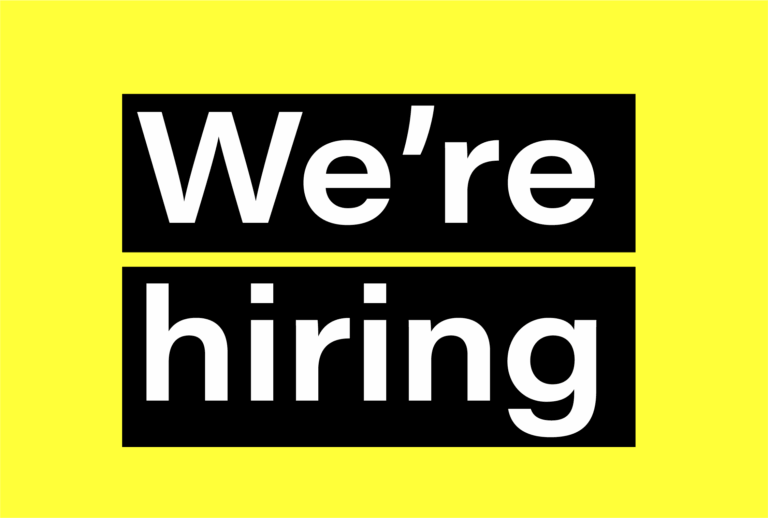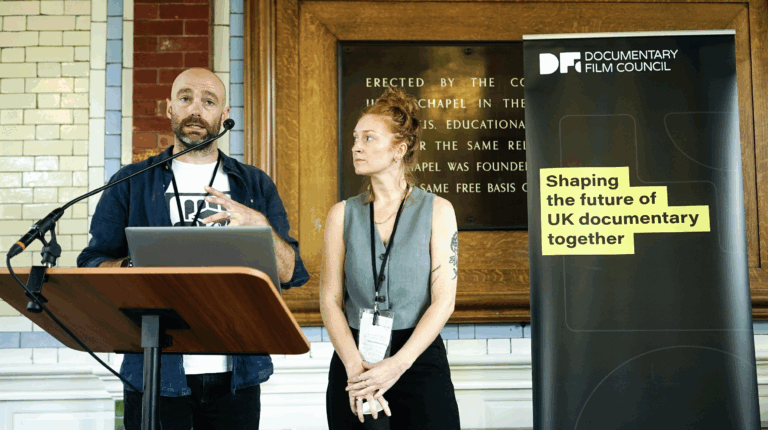Frequently Asked Questions
Have a question you want to ask? Check our our frequently asked questions below first…
The DFC developed from a research project funded by the Arts and Humanities Research Council (AHRC). As part of that project, filmmakers, organisations and executives from across the industry explored the problems facing the sector and how these might be addressed. The findings of this work were published in two reports, Keeping it Real (2020) and Making it Real (2021), both of which can be downloaded from our Resources page.
Making it Real included a proposal for a new democratic organisation to represent the sector to industry and government. In Spring 2023, with seed funding from UK Research and Innovation, the DFC was incorporated as a co-operative, and the rest is history… For more information please see the ‘Story so far’ section on our About page.
The DFC’s mission is to represent the documentary sector to industry and government and to build documentary film culture and community in the UK. All of our work connect to these two fundamental objectives.
In addition to the work done by the leadership team, the DFC’s Member-led committees can also lead on key issues facing the sector. Find out more about DFC committees and how to propose a commitee on an issue you’re passionate about.
The Directory is a resource exclusively for the UK’s documentary film industry. It is designed to raise the profile of the workforce in our sector and make it easier to recruit people from under-represented backgrounds, thus mitigating the negative impacts of word-of-mouth recruitment.
The Directory is for everyone who works, or wants to work in this sector, in whatever capacity, from producers, directors, editors, archivists and academics to distributors, exhibitors, curators, commissioners and executives. The only criteria are that you are UK-based and actively working or intending to work in the UK independent documentary industry. Create your profile when you join the DFC.
The Talent Directory has been created with support from FWD-Doc: Filmmakers with Disabilities.
Great! You can filter our Talent Directory by a range of categories – job title, gender, race & ethnicity, sexuality, location, experience level, and so on – to ensure you can find the people you are looking for and to help build a more diverse, equitable and inclusive UK documentary film sector.
The mental health crisis in the screen industries is particularly acute among documentary filmmakers because of the uniquely complex ethical and emotional demands of making films with and about real people. The DFC’s Mental Health Committee, led by Rebecca Day of Film in Mind, addresses the challenges facing documentary filmmakers’ mental health in two ways.
First, the Committee is developing the skills of three new mental health supervisors – all trained therapists with experience in the film industry – to amplify the supervision model created by Film in Mind and thus to support clients in managing the ethical and emotional challenges connected to their filmmaking and career development.
Second, the Committee is providing additional support to the ongoing research project, DocuMentality. With a report due for release later this year, DocuMentality aims to highlight the mental health crisis that the international documentary community currently faces, to bring together filmmakers, funders and industry reps for collaborative, solution-focused discussions, and to advocate for systemic change.
The DFC is a co-operative comprising four principal elements: Members, Board, Leadership Team and Committees. The Members elect the Board and help shape the DFC’s strategic agenda via an annual Open Assembly at DocFest in June, at General Meetings throughout the year and an AGM in December. The Board develops the strategic agenda based on consultations with the Membership, and funds Member-led Committees to carry out work packages relating to the strategic agenda. The Leadership Team runs the day-to-day business of the DFC, organising the consultations and supporting the Committees.
The DFC incorporated as a co-operative in May 2023, following two rounds of research and consultation in the autumn/winter of 2022. There are different kinds of co-operative, but all share an explicit commitment to the co-operative Values and Principles as laid down by the International Co-operative Alliance. All co-ops are independent, democratic organisations that are run by and for their Members according to the principle of one-member, one-vote.
The DFC is a specific type of co-operative known as a Community Benefit Society (CBS). This structure was felt to be particularly appropriate because it means that the Members must run the organisation in the interests of a broader constituency – in this case the UK documentary community.
Furthermore, as a charitable CBS, the DFC benefits from all the financial advantages available to charities without the heavy demands of being regulated by the Charities Commission (as a co-op, the DFC is regulated by the FCA). Perhaps more importantly, the DFC’s charitable status means it explicitly exists ‘for the public benefit’. Promoting documentary film as a public good was a key Making It Real recommendation. You can find out more about the DFC’s governance structure below and in our Resources section. The DFC is also a member of Co-ops UK, which has lots of information about co-operatives on its website.
Our co-operative governance model ensures the most critical decisions are taken by our Members at General Meetings or the AGM, on a one-member one-vote basis. We will also run consultation processes to feed into the Board’s decision-making.
The Board works with the Leadership Team (which is led by the CEO) to develop the DFC’s strategic aims in response to consultations.
Not necessarily. The DFC’s organisational structure is intended to strike a balance between accountability and empowering the organisation to get on and do the work it was set up to do. Refining and maintaining that balance will be an ongoing process, but there is nothing inherent in the co-operative model that means all decisions will be made slowly. It is also worth remembering that some decisions should be made more slowly, with the democratic input of the Membership, and that taking the time to get that right is a good thing.
The Board is made up of elected Members, who form a majority; and non-elected Directors, appointed by the Board. An election process takes place annually to elect the Member Directors. The maximum term a Director can serve is three years, which will ensure both continuity and fresh ideas.
In the lead-up to the AGM, the DFC will run an election process, open to all members. Any member can self-nominate to be considered for election. We have drafted guidelines to explain the process here.
The DFC elects its Board members every year. However, because the DFC’s work will unfold over a series of three-year terms, Board members will ideally seek to serve for three years (i.e. they will stand and be elected three years in a row). That said, Board members may choose to stand down at any time. This would create a casual vacancy to be filled via a by-election subject to approval of the Board.
The three-year term is designed to ensure continuity of management while tracking the progress of the DFC’s work.
The DFC’s Board is accountable to its Members via two main mechanisms. First, the Board is elected by the Members, and the DFC’s Primary Rules stipulate that a majority of the Board of Directors must be Members of the DFC (other Directors may be appointed from outside the organisation based on skills or expertise, for example, or appointed from international organisations such as the Documentary Association of Europe (DAE) or the International Documentary Association (IDA)).
Second, if Members are unhappy with the Board – for example, if they feel that the Board is not representing their interests or is behaving inappropriately – they can call a General Meeting so long as that call is supported by one tenth of the total number of Members. If any member of the Board is deemed to be behaving in ways detrimental to the interests of the DFC, that Director may be suspended. More information about meetings, voting, quoracy and other governance protocols is available in the DFC’s Primary Rules.
Committees may form in response to consultations with members, allies and the wider sector.
Supported by the Board, the leadership team design, recruit and resource committees and hold them to account, based on the strategic priorities as agreed by the Members.
Ideas for committees can be proposed by DFC Members by sending an Expression of Interest to the leadership team.
In a variety of ways. DFC is designed around participation, online and in person. The DFC launch event at Sheffield DocFest 2023 will be our first Open Assembly, an annual facilitated consultation exercise at the festival in which members of the documentary community help shape the DFC’s strategic priorities. We will also set-up a sector-wide Mailing List (coming soon!). DFC Members will also be invited to General Meetings, be able to vote and stand for election, and to propose and lead Committees. Members will also be able to access our online consultation platform, Loomio.
Not at the moment. Although the charitable Community Benefit Society (CCBS) was agreed as the best structure for the DFC, it is very unusual for a CCBS’s Board of Directors to be paid. This is obviously a problem for the DFC, because it disincentivises those on precarious incomes – i.e. the vast majority of producers and directors – from serving on the Board of an organisation designed to support them.
Fortunately, there are a couple of ways around this. In the short-term, we are establishing a paid Filmmakers’ group, the purpose of which will be to liaise with the Chair of the Board to ensure the views of filmmakers remain at the forefront of the DFC’s work. In the longer term and with the advice of Co-ops UK, we are working on getting special permission from the Charities Commission to pay our Directors (the General Medical Council has set a precedent for this but it will take a while).
It’s possible to sign-up to the DFC’s newsletter for free. However, one of the principles of co-operativism is that everyone contributes to the organisation financially, and we really need your support.
For just £12 per year you can become a DFC Ally, and for £24 per year you can become a Member. Find out more about our three subscription tiers here.
Ally membership is for international supporters and UK residents who wish to support the DFC but not participate in its democratic processes.
Allies and Members can join the Directory, use the Forum, access discounts and subscribe to our newsletter.
This category of membership is exclusively for UK residents. As a Member, you are a co-owner of the DFC co-operative and are eligible to vote, propose committees and/or stand for election.
Members and Allies and join the Directory, use the Forum, access discounts and subscribe to our newsletter.
You cannot become a full Member of the DFC or create a profile for the Directory unless you are based and work within the UK. However, there are no restrictions to become an Ally. If you are based outside of the UK, for just £12 per year you can show your support, join the community and benefit from access to resources and industry discounts (TBC!).
Both Ally and Member subscriptions must be renewed annually.
When you become a Member, you are entered onto a register of Members and become a joint-owner of the DFC along with all the other Members of the co-operative. Membership runs for one year and is renewable one year from the date you sign up. As a Member, you are responsible for shaping the DFC’s work. You elect the board, help make decisions at General Meetings and the AGM, and run the Committees we need to build a better future for independent documentary in the UK.
The Members who propose a Committee will decide how that Committee is set up, how many people are on it, and how much money is requested to run it and who will get paid. Using the AHRC seed-funding grant as a template, we anticipate funding Committees with anywhere from £1,000-£10,000, but it will be up to Committee proposers to decide on the budget they need.
Become
a member
Owned and run by and for its members, the DFC is the first national organisation for the UK’s documentary film industry.



